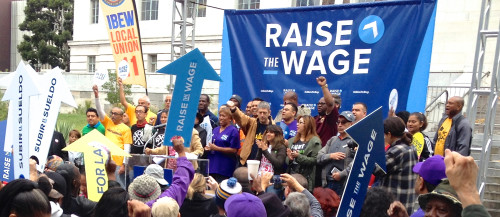
The Santa Monica City Council will vote on an ordinance Tuesday that would raise the city-wide minimum wage to $15 an hour by July 1, 2020 for most businesses.
As proposed, Santa Monica’s new living wage ordinance would mirror Los Angeles’ new living wage law, passed by the L.A. City Council in June. Santa Monica’s ordinance, as proposed, would also follow the same implementation schedule as Los Angeles and also include an annual cost-of-living adjustment after 2020.
“In addition to the Los Angeles City ordinance, Los Angeles County is expected to adopt the same minimum wage parameters for the unincorporated areas of Los Angeles County, where the Board serves as the wage setting entity, and nearby cities including Beverly Hills, West Hollywood, Long Beach, and Pasadena are considering similar increases,” according to the staff report.
If approved, most workers in Santa Monica would see their pay raised to $10.50 an hour on July 1, 2016, which is also the same day that the statewide minimum wage is set to rise from $9 an hour to $10 an hour.
“The proposed Santa Monica ordinance mirrors that of the City of Los Angeles and includes the same conditions and exceptions for youth learners [workers 14 to 17 years old], small businesses, and nonprofit organizations,” according to staff.
“Los Angeles is the dominant economic force in the region, and its wage increase will impact Santa Monica’s businesses and labor market even if Santa Monica does not act. Absent any Santa Monica action, businesses and nonprofits will need to increase wages to remain competitive with Los Angeles,” staff said. “Several of Santa Monica’s nonprofit organizations also operate in Los Angeles, where they would be subject to the higher minimum wage rate.”
Still, there is some concern, especially from business owners, about the impact of the proposed minimum wage.
According to staff, over the course of several recently-held community outreach meetings, “most attendees acknowledged the need for a coordinated regional approach to the minimum wage, but expressed concern about treatment of tipped workers, timing, and the magnitude of the increase. Other concerns included the ability to stay in business, concern for independent or smaller restaurants, and student seasonal workers.”
Two key differences remain, however, between Los Angeles’ ordinance and the one proposed for Santa Monica.
According to the staff report, the ordinance includes an exemption for collective bargaining, or “union supersession,” which allows collective bargaining units to negotiate for wages below the minimum in exchange for better benefits.
“Union supersession is already a condition of Santa Monica’s living wage policy and some development agreements,” staff said. “However, some businesses have expressed concern that including this provision in the minimum wage ordinance could create a competitive disadvantage for nonunion businesses.”
Santa Monica’s ordinance also includes language regulating the distribution of service charges.
“According to State law, mandatory service charges may be distributed at the employer’s discretion, while voluntary service charges are the property of employees,” staff said. “Santa Monica’s Council directed staff to include language in the ordinance that ensures any service charge remains the property of the staff providing the service.”
“This provision does not affect a business owner’s decision to use a service charge, but ensures that the charge is spent on the employees providing the service,” staff said.
There are also some outstanding issues that aren’t addressed in the proposed ordinance, including a possible accelerated minimum wage increase for hotel workers.
“The Los Angeles Hotel Worker Minimum Wage Ordinance, adopted in October 2014, sets a living wage of $15.37 for certain hotel workers, with inflation-based increases beginning on July 1, 2017,” according to staff.
Santa Monica currently requires city contractors with contracts of more than $54,000 to pay the same minimum wage.
While this provision is not part of the current proposed ordinance, the Council could direct staff to draft language for approval at a later date.
For more information, visit Santa Monica’s Housing and Economic Development website. The draft ordinance is also available here [PDF].






